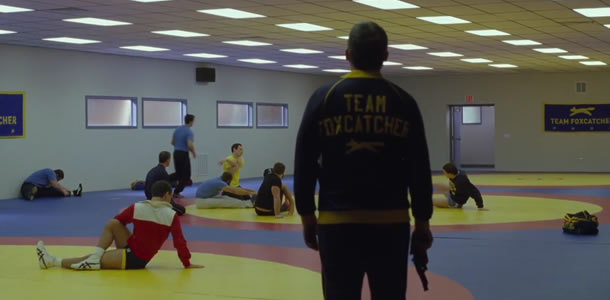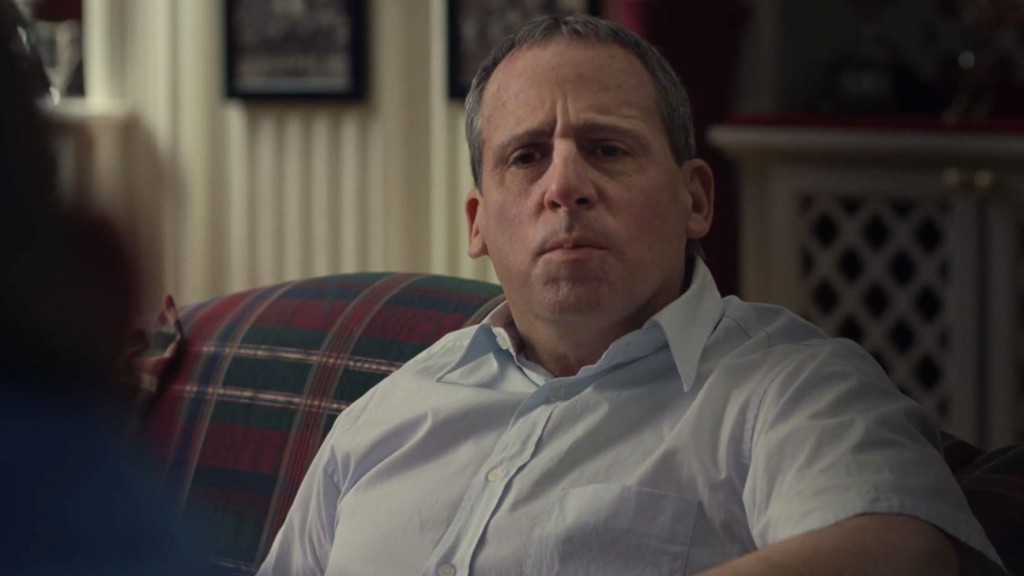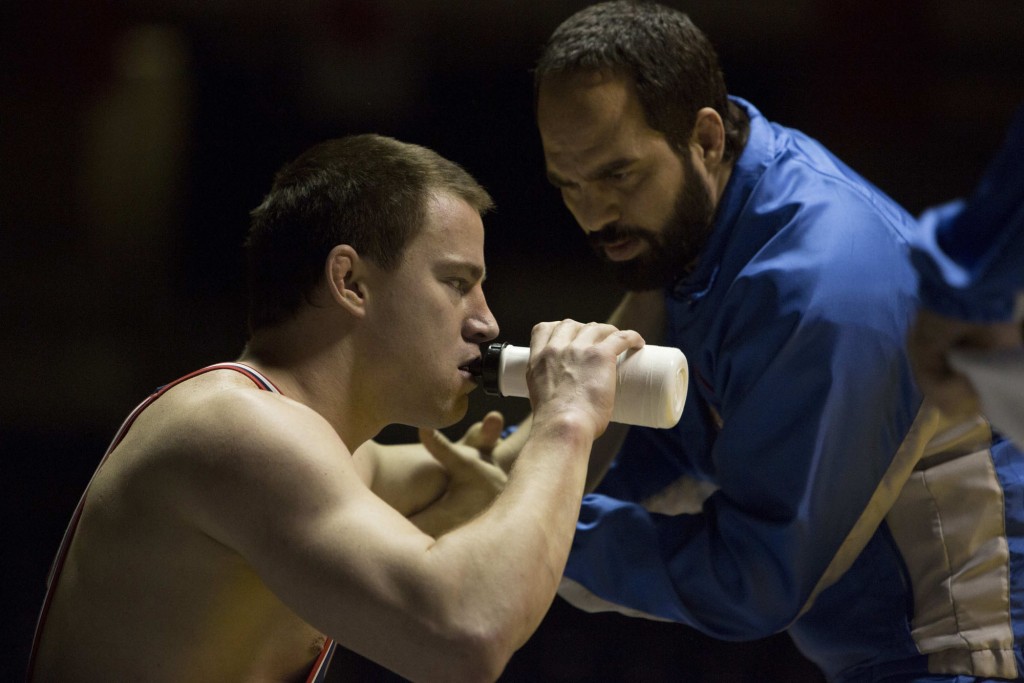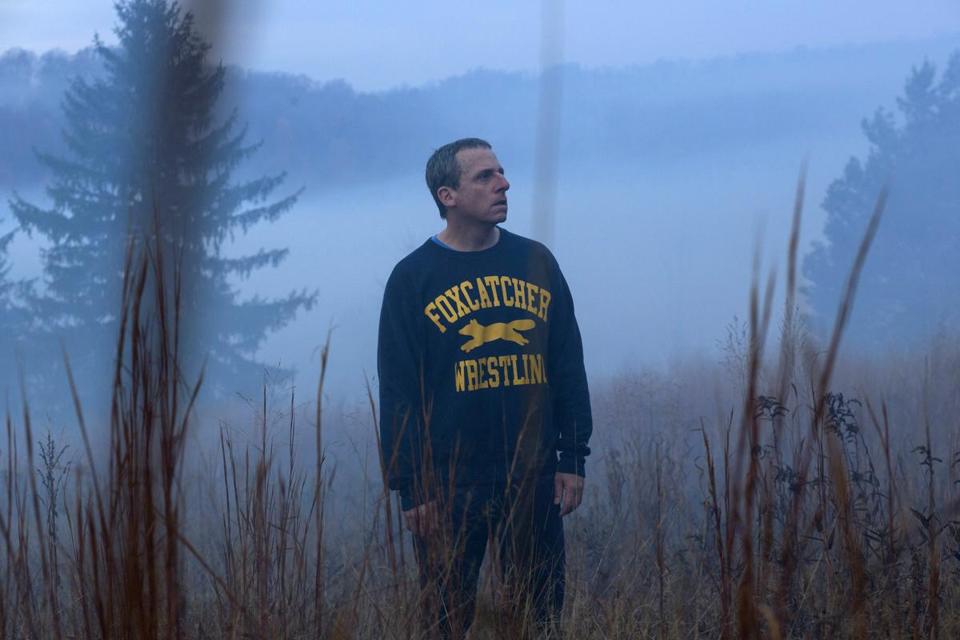In Foxcatcher, Capote helmer Bennett Miller doesn’t stray far from the style employed in his debut: efficient storytelling helped along by a somewhat reserved sense of direction. He continues to be a filmmaker unafraid to let his audience put two and two together. Whole scenes unravel without the aid of a manipulative musical score, relying instead on the percussive pounding of flesh on wrestling mats, heavy breathing, and the proper application of silence. It doesn’t have the lean running time of his first film, but its two hours and fourteen minutes give it more room to breathe, and allows us more time to watch its principal characters.
Foxcatcher is the story of two brothers, David and Mark Schultz (Mark Ruffalo and Channing Tatum), both accomplished, Olympic gold medalists in wrestling. Mark lives in David’s shadow and longs to accomplish bigger and better things. He appears dimmer than his elder brother, more monosyllabic, but there’s a yearning there, a need to be accepted. America’s Big Brother Mark Ruffalo presents David as the kind of loving, protective figure I think most only children fantasize about playing catch with. In their every interaction, it’s clear that David loves Mark and is proud of him, but Mark needs something more. Enter Steve Carrell’s John du Pont.
An eccentric rich person who Really Likes Wrestling, du Pont has deluded himself into thinking that helping someone win a gold medal will end the Cold War. Or something. That’s his pitch to Mark, anyway, and Mark, being similarly deluded, goes along with it, moving out to Foxcatcher Farms to train with du Pont as his “coach.” There, the film transforms into an uncomfortable Hitchcock drama for a bit, complete with du Pont as the emasculated villain, introducing cocaine into Mark’s life and creating a pretty twisted bromantic love triangle between the two brothers and himself, a severely damaged millionaire who never even had the chance to get picked last for sports. (He was raised with no men around, unless you count his mother’s horses.)
Having done some very minor research into the facts this “true crime” film is based on, the murder that ties the tale together almost feels like an afterthought. Reality has been bent to make the story more cogent and thrilling, but not in the Informative Murder Porn way you would expect. Events and chronology are bent to serve a truly haunting and disturbing story about fitting in and the predominately masculine preoccupation with achieving greatness through physical sport.
The sport of wrestling comes naturally to Dave in a way that it just doesn’t for Mark. The fact that Dave is the one who primarily helps Mark improve is just another twist of the sibling rivalry knife. That Dave loves Mark and never once seems to feel above him gives the story a biblical sense of tragedy, which Ruffalo and Tatum perform flawlessly. Their first moment on screen together is one long bit of the two sparring wordlessly and in that tug of war for dominance their entire relationship is laid out for the audience. It’s one of the finest examples of “show, don’t tell” in film this year. Ruffalo is a supremely underrated actor, doing so goddamn much with so little. Whether through mild alterations in his face or repeatedly patting his brother on the shoulder, the sheer breadth of his love is apparent. You keep expecting a big Oscar-level speech between the two, making subtext explicitly stated. Thankfully, this film never stoops to that.
Channing Tatum delivers the work of his career as Mark. He’s the real protagonist of the piece and brings you into his head without the crutch of expository dialogue or quirky acting tics. His performance is a very physical one, and the fact that he’s playing something of a grunting jock will unfortunately take away from people’s opinion of his turn, as if he’s just playing himself. There’s a whole scene during the Olympic trials in which he retreats to his hotel room, smashes his head into a mirror and then proceeds to self sabotage by eating his weight in cake and room service. It’s maybe my favorite scene of 2014, largely because it’s followed by Dave intervening and getting him back into shape in 90 minutes. I truly feel like their work together is astonishing.
So, Steve Carrell. Guaranteed to get award looks for this. My problem isn’t with his performance, which is quite good. His du Pont is a fascinating, if cringeworthy screen presence. The film seems less interested in his transformation into a cold blooded killer and more focused on exploring his tenuous, troubled relationship with reality. In some ways, du Pont plays like an exponentially more fucked up version of The Office‘s Michael Scott, particularly in scenes in which du Pont drunkenly tries to wrestle his “students,” and another in which he pretends to coach them to (unsuccessfully) impress his disapproving mother (Vanessa Redgrave). He’s solid in the role, but I’m really over Hollywood’s obsession with lauding comedic performers for taking serious roles instead of appreciating the great work they do as comedic performers. Carrell’s work on The Office and in The 40 Year Old Virgin were relevatory, but it’s going to be his blue blooded Oswald Cobblepot cosplay that might win him an Oscar.
That might be the film’s biggest weakness: a cast of talented actors who all have proven comedic chops acting out a reserved melodrama that takes itself incredibly seriously. At times, by virtue of this juxtaposition, Foxcatcher becomes the funniest film of the year. If it’s on purpose, then kudos, because it works, except when that humor abruptly gives way to truly disgusting imagery, like a late night sparring session between Mark and du Pont that visually implies rape. I suppose those transitions work in their own way, if the desired effect is to make you throw up in your mouth.
While it doesn’t quite function as an effective true crime tale, Foxcatcher is an impressive film that depicts the double edged sword of male camaraderie, a blade that offers safety and comfort while unintentionally fomenting jealousy and contempt. Its finest moments are as loving as they are discomfiting, and it even achieves a sense of majesty, especially with the sequence in which du Pont frees his mother’s horses after her death, a distinct moment of poetry that feels like it was conjured from another film altogether. It offers far more than Steve Carrell’s fake nose.
Foxcatcher is out now in limited release.






One thought on “Foxcatcher Grapples With Masculinity [Review]”
Comments are closed.